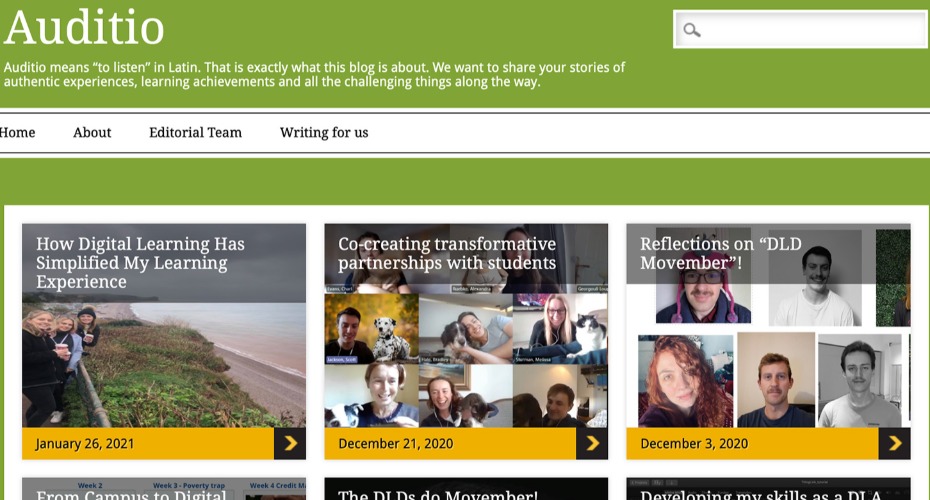
Taking Grand Challenges online to create engaging learning experiences
17 March 2021
Taking Grand Challenges online to create engaging learning experiences
Grand Challenges week plays a key role in the Exeter calendar, giving students the opportunity to work in cross-discipline groups to design innovative solutions to real world challenges. But in COVID-19 times, Grand Challenges has adapted to become Challenges Online.
 In its first iteration in June 2020, over 400 students worked in 67 teams, across 16 time zones, to address challenging global problems such as climate change and fake news. The event provides a great example of innovative educational practice which can be adapted in a variety of contexts to enhance the learning experience for staff and students. Challenges Online was shortlisted for the global Reimagine Education Awards in December 2020.
In its first iteration in June 2020, over 400 students worked in 67 teams, across 16 time zones, to address challenging global problems such as climate change and fake news. The event provides a great example of innovative educational practice which can be adapted in a variety of contexts to enhance the learning experience for staff and students. Challenges Online was shortlisted for the global Reimagine Education Awards in December 2020.
While Grand Challenges usually features face-to-face collaboration, running the event online provided some advantages.
It alleviated the need to find suitable collaborative physical space and allowed students to take part from other institutions across the world. Online ways of working were enthusiastically embraced, resulting in even greater energy and outputs than in previous Grand Challenges events. Students were exposed to different ways of thinking, and equipped with employable skills in collaboration, communication and the delivery of presentations to a large audience. Working online reduced the carbon footprint of the event by about 20 tonnes of carbon.
So how did it work?
Challenges Online presented some major challenges. Students needed to commit to working together virtually from their lockdown locations all around the world. The university had to take a leap of faith by committing to run its flagship event using untried technology, when the easier option would just have been to cancel the programme. Everything had to be delivered at very short notice.

Students took part from across the world
“Initially we were unsure how the locked down, globally dispersed students would respond to an invitation to take part,” explained Lisa Harris, who helped to organise the event. “Most had little – if any – prior experience of collaborative working online. All around us, events were being cancelled outright.
“But we had an immediate and strongly positive reaction from students, many of whom had lost their opportunities for internships and other employability-related programmes. This was despite a narrow sign–up window, our limited ability to promote the revised programme, and the fact that participation was entirely voluntary and not credit bearing.”
Rather than looking for ways to transfer the existing model online, the team considered how digital participation could achieve the same objectives by identifying new opportunities and overcoming barriers to online working. For example, it allowed students based on different campuses to work together, and increased diversity by admitting participants from other universities across the globe. With no need for people to travel to Exeter, guest speakers and other external experts became more available to contribute. At the same time, new challenges looked at how to create and sustain engagement online, work across multiple time zones, build expertise in online facilitation, introduce suitable digital platforms and tools, train participants how to use them, and deal with inequality of access to technology and the Internet.
“Given the circumstances, to have a significant majority of students still keen to undertake the challenge, alongside the other issues we faced with technology barriers, demonstrates our outstanding level of commitment” – Student Participant
Microsoft Teams had been rolled out across the University in March 2020 and Challenges Online was the first University-wide programme to use it. A structure was created with teams of parallel challenge cohorts under the four themes of climate and environment, food sustainability, fake news and loneliness and mental health. This structure was then customised to accommodate skills development and training webinars, channels for parallel group work (8,600 posts were shared during the week), and sites for storing documents (50GB of files were shared between students). This allowed different types of interaction: one-to-one within small groups, groups of students to a facilitator, academic staff member to large cohorts, and technical and programme support to all participants.
Other digital tools used included Padlet for brainstorming, Mentimeter for surveys and YouTube for communication of student outputs.
??? #ChallengesOnline WINNERS are in!!!#FightingFakeNews: Policy – BLM Action Day#LonelinessandMentalHealth: Preventing Loneliness 1 – Friendli#ClimateChange: Storylines Children – Save our Chocolate#FoodForThought: Threats to Food Security – Novel Technology (Hermatec) pic.twitter.com/n5pU1wXLZn
— Grand Challenges (@gc_exeter) June 26, 2020
Professor Peter Cox, Team Lead of Challenges Online, said: “Our approach draws on the intrinsic motivation of students to make a difference, and applies their combined knowledge, passion and creativity to generate ideas with potential for real-life impact. The delivery model uses PhD students as facilitators of peer learning and co-creators of knowledge, students as peer leaders and programme administrators, non-academic guest participants to share personal perspectives and real-life experiences, and academic experts as conduits of evidence-based discovery.”
Looking ahead to Challenges Online 2021
362 students completed Challenges Online by engaging in their group work throughout and presenting their work on the final day.
The benefits of Challenges Online can be seen in student feedback from the event survey:
- 98% said that Challenges Online had improved their employability skills
- 94% would recommend the experience to other students
- 90% said it gave them opportunities they would not otherwise have had
One participant commented: “This programme develops vital skills such as team working and time management – and all within five short days. To develop these skills in a sprint like this shows a vast array of skills which would be attractive to employers.”
Another wrote: “One of the most notable skills employers say graduates lack nowadays is resilience. To be thrown into a group of people who you don’t know – working on Teams, a platform many had never used before – to tackle such broad topics and attempt to produce deliverables, in just five days, is one of the most testing and daunting projects I have ever heard of.”
Feedback also showed how the interdisciplinary way of working used in Challenges Online helps students to broaden their career horizons, and even rethink their career path by opening up new fields they may not have considered.
This year the University plans to increase the proportion of students from other institutions to enhance opportunities for global perspectives, peer learning and cultural exchange. Working with the Global Opportunities team, a virtual exchange model is being developed and offered to select partner institutions. The intention is also to incorporate MOOCs created by Exeter within the programme, as trialled last year by the Food Sustainability Challenge.
Inspired by Challenges Online, several projects are exploring the possibilities of online learning events that are partly synchronous and partly asynchronous in their structure and operation. This includes the need to evolve events previously held as ‘writing retreats’ into less expensive and more inclusive formats, and to advance pedagogies which more actively engage students in their learning.


